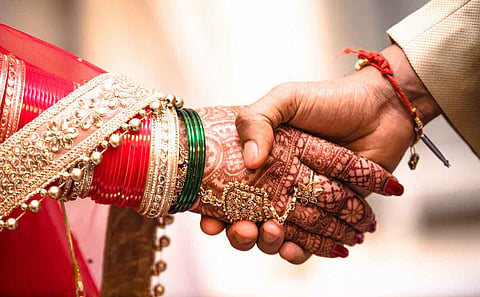

The Supreme Court Monday refused to admit a transfer petition filed by the Uttar Pradesh Government seeking to transfer all the petitions challenging the "Love Jihad" ordinance from the Allahabad High Court to the Supreme Court.
A bench led by CJI SA Bobde said it would not stop the High Court from examining the issue. He added he would like to have the benefit of the High Court's order.
Sensing the mood of the Court, Senior advocate PS Narasimha, for the UP Government, chose to withdraw the transfer petition.
The transfer application arose after the Supreme Court on January 6 issued notice on a batch of PILs challenging the constitutional validity of the controversial 'Uttar Pradesh Prohibition of Unlawful Conversion of Religion Ordinance, 2020', also called the "Love Jihad" Ordinance which regulates marriage-related religious conversions.
Notice has also been sent to the Uttarkhand Government for a similar legislation namely 'Uttarakhand Freedom of Religion Act, 2018'.
The Allahabad High Court had already issued notice on PILs challenging UP's love jihad law in December 2020.
When the matter came up for hearing before the High Court last week, the UP government stated that it would be filing a transfer petition in the Supreme Court. The High Court, thus, adjourned the matter awaiting orders from the apex court in that petition.
The UP Governor on the recommendation of the Yogi Adityanath government had promulgated the ordinance on November 27.
The ordinance provides for a jail term of a minimum of one year to a maximum of five years with Rs 15,000 fine for forceful, deceitful religious conversions. For conversions of minors and women of the SC/SC community, there will be a jail term of 3-10 years with a Rs 25,000 penalty.
If a person wants to perform a marriage after converting to any other religion, they will need to inform the District Magistrate(DM) two months before the wedding. A failure to inform the DM will invite imprisonment from six months to three years and a fine of Rs.10,000.
In the case of mass conversions, the punishment is from three years to 10 years and a fine of Rs. 50,000 on organisations that indulge in it.
It also seeks to declare the marriage null and void in case of conversion done by a woman for the sole purpose of marriage.
The ordinance came despite a recent Allahabad High Court order holding that the right to live with a person of their choice irrespective of religion professed by them, was intrinsic to the right to life and personal liberty.
Immediately after the issuance of the Ordinance, many news reports have surfaced indicating the 'misuse' of the Ordnance against inter-faith couples.
Police reportedly stopped an interfaith wedding in Lucknow, citing the Love Jihad law after receiving complaints from fundamentalist Hindu outfits. The police intervened on the day of the wedding, despite the consent of the families of the Hindu bride and Muslim bridegroom.
As per the report in The Print, in three of the five cases, the alleged crimes were committed before the promulgation of the law, which means it was unconstitutional to prosecute them under the controversial law.
Early this month, the Madhya Pradesh government also issued its own "Love Jihad" ordinance to prevent forceful conversions for inter-faith marriages.